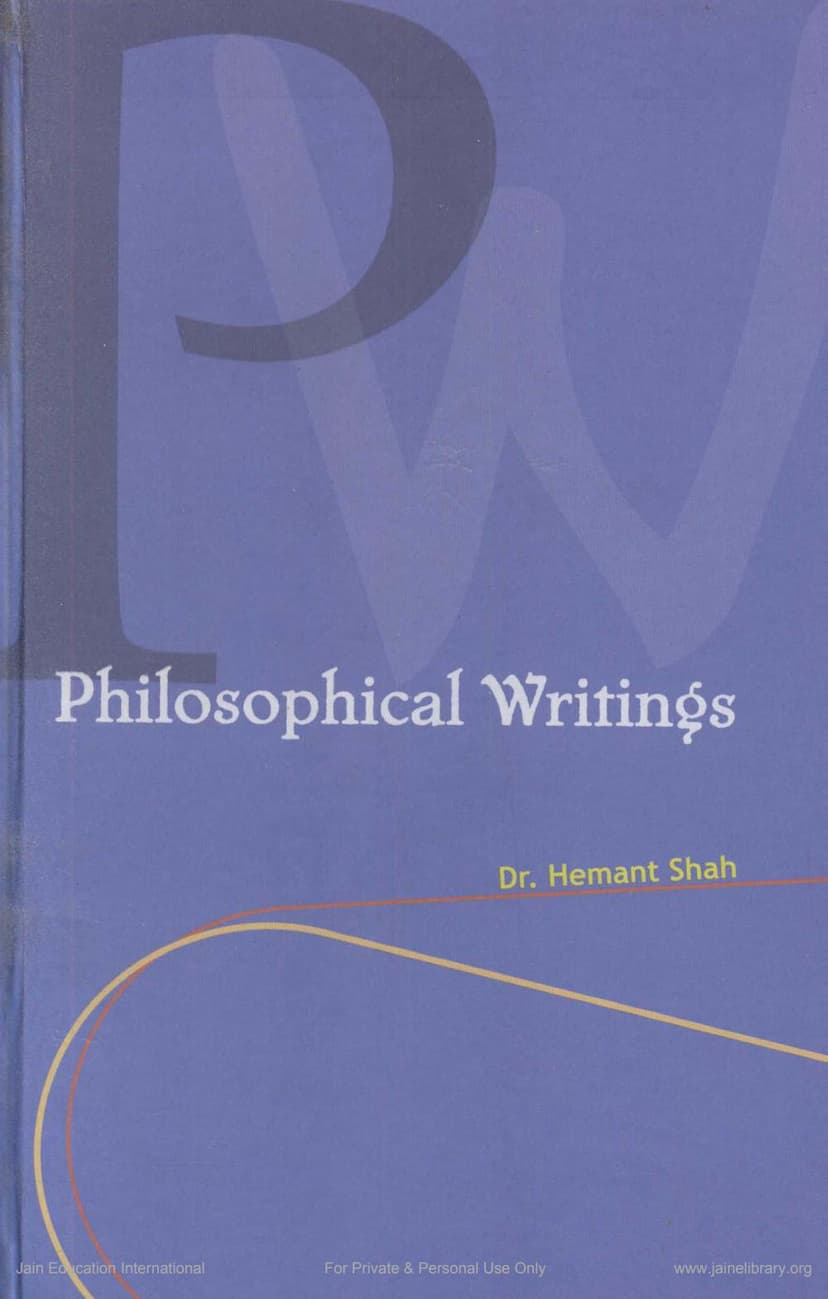Philosophical Writings
Added to library: September 2, 2025

Summary
This book, "Philosophical Writings" by Dr. Hemant Shah, is a collection of research papers presented at national and international conferences. The author aims to introduce readers to various philosophical concepts, emphasizing the Indian perspective where applicable, and highlighting the interconnectedness of different philosophical branches.
The book covers a wide range of topics, including:
-
Freedom, Obligations, and Rights from a Jain Perspective: This paper contrasts Western and Indian philosophical approaches to these concepts, emphasizing the Jaina focus on the spiritual nature of the soul and its liberation from karma. It discusses the Jaina vows (Mahavrata and Anuvrata) as obligations that lead to spiritual development.
-
Logos in Philosophy, Religion, and Science: The author explores the concept of "Logos" from ancient Greek philosophy (Heraclitus, Stoics, Philo, Neoplatonism) to Eastern mystical traditions (Hinduism, Buddhism, Taoism, Zen) and modern physics. A key argument is that the metaphysical concept of Logos, representing unity, interrelationship, and dynamic nature, finds parallels across these diverse fields.
-
Philosophy and Medicine from an Indian Standpoint: This section delves into the intimate connection between philosophy and Indian medical science, particularly Ayurveda. It outlines Ayurveda's holistic approach to life, emphasizing the balance of mind, body, and soul, and its spiritual underpinnings, contrasting it with the more mechanistic approach of modern Western medicine.
-
The Role of Beauty as a Value in Everyday Life: The paper surveys the concept of beauty from classical Greek and Indian philosophy to modern interpretations. It discusses beauty as a subjective experience and an objective quality, exploring its relationship with truth and goodness, and its importance as a guiding force in life.
-
Concept of Beauty in Vedanta: This paper specifically focuses on the Vedantic understanding of beauty, equating it with Brahman (the ultimate reality) and Ananda (bliss). It emphasizes inner harmony and the realization of truth as integral to true beauty, and the experience of beauty as a path to spiritual realization.
-
Education for Peace in Schools: This paper advocates for education that fosters peace not just as the absence of war, but as a positive concept involving inner peace and harmony. It stresses the role of education in changing individuals' mindsets and behaviors to promote a culture of peace, drawing upon the UNESCO report "Learning to Live Together."
-
Education of the Future: Dr. Shah discusses the evolution of educational philosophies, from traditional approaches to the need for a new paradigm that integrates spiritual development with intellectual and practical skills. He highlights the importance of intuition and a holistic approach to prepare individuals for a rapidly changing world and their role in humanity's evolutionary journey.
-
Tantra and Philosophy: This paper explores Tantra as a system with its own philosophy, often misunderstood. It discusses Tantra's synthetic approach, its emphasis on action and experience, its unique understanding of sound (Mantra) and geometry (Yantra), and its concept of energy centers (Chakras). The paper aims to demystify Tantra, presenting its practical and often esoteric aspects.
-
Values and Justice - A New Perspective: This section examines the concepts of values and justice from philosophical viewpoints, focusing on their relevance in the modern world. It discusses the influence of Indian philosophical traditions, democratic and socialist values, secularism, and the challenges posed by fundamentalism. The paper also touches upon the nuances of justice in Western philosophy (Socrates, Plato, Aristotle, Rawls) and their connection to Indian ethical thought, advocating for a balanced approach to achieve social justice and harmonious living.
The book emphasizes that philosophical inquiry is essential for understanding existence, oneself, and one's place in the universe. It aims to bridge Western and Eastern philosophical thought, promoting a holistic and integrated understanding of life, values, and the pursuit of wisdom.